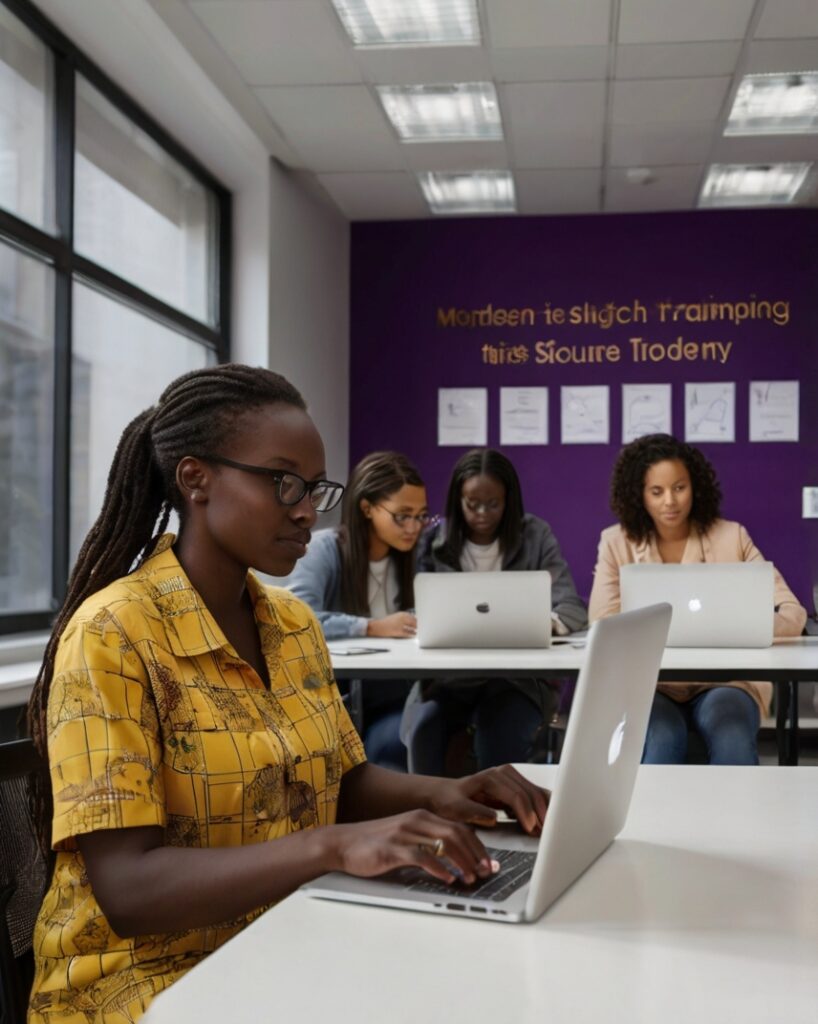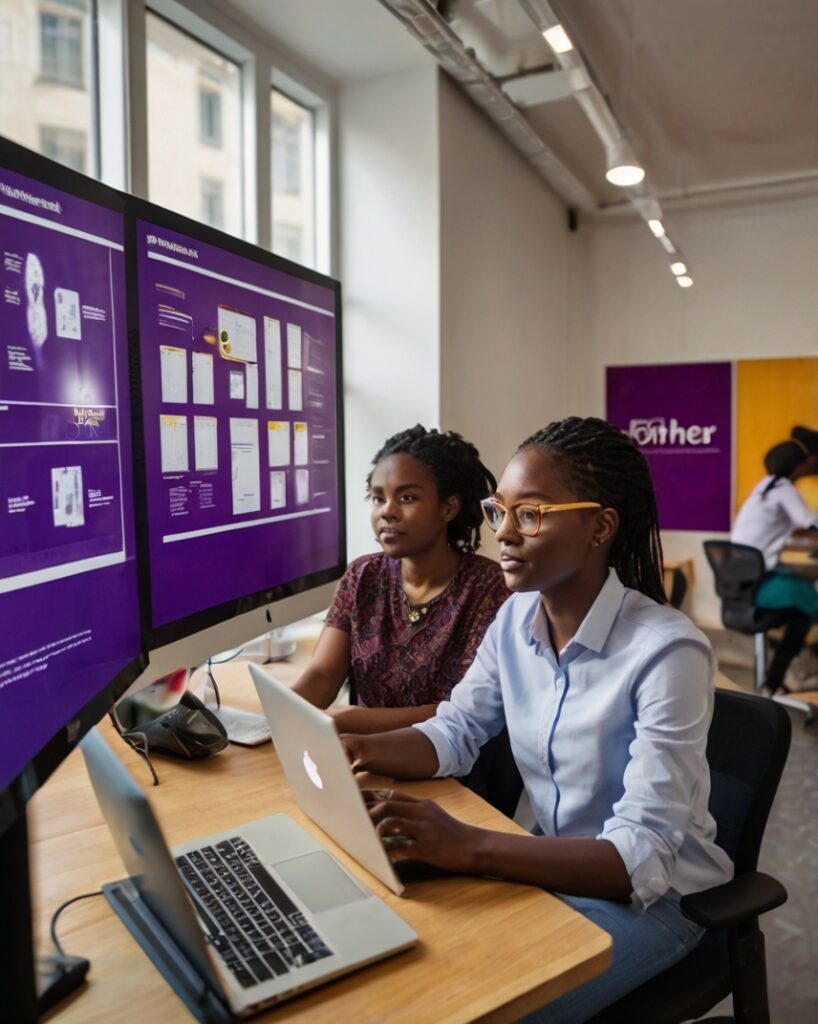Across many rural parts of Kenya, girls and women face a widening digital divide that limits their ability to learn, connect, and compete in the modern world. Access to computers, reliable internet, and professional mentorship remains a privilege few can afford. Many girls grow up with little or no exposure to digital tools, leaving them unprepared for opportunities in today’s technology-driven economy.
At FoHer Digital Academy, we are working to change that reality.
We provide free digital skills training and leadership programs for girls and women from underserved regions. Our one-week, hands-on training equips participants with essential computer skills, online communication tools, internet safety practices, and pathways to online jobs, innovation, and entrepreneurship.
Beyond digital literacy, FoHer Digital Academy builds a community of mentors, trainers, and peers who guide learners in their personal and professional growth. Our mission is not only to teach technology but also to nurture confidence, leadership, and independence among young women — helping them become changemakers in their communities.
Technology becomes a bridge of hope when placed in the hands of a girl who once thought she had no future. At FoHer Digital, we build those bridges; one girl at a time.
The Digital Divide in Kenya
The digital gender gap remains one of the biggest barriers to inclusion in rural Kenya.
According to the Kenya ICT Access and Usage Survey (2023/24) by KICTANet, only 7.3% of rural Kenyans have recently used a computer compared to 20.9% in urban areas. The same study found that just 10.7% of Kenyan households have access to a computer.
Internet usage shows an equally wide gap. Nationally, about 35% of Kenyans use the internet. However, in urban areas, this rises to 56.5%, while in rural areas, it falls to 25%. Among rural women, only 21.7% use the internet compared to 28.3% of rural men.
For women with disabilities, the gap is even wider. Only 13.7% of women with disabilities in rural areas have internet access, compared to 42.5% in urban regions, according to KICTANet’s 2024 report on Bridging the Digital Divide for Women with Disabilities.
These numbers highlight a serious issue: digital exclusion limits access to education, employment, and innovation — especially for girls in rural areas.
Access is not the only barrier. Social attitudes and cultural expectations continue to discourage girls from engaging with technology.
A 2023 study by Maseno University found that gender stereotypes significantly lower girls’ confidence and performance in science and technology subjects. Many girls perceive STEM and ICT as “male domains” and hesitate to enroll in such courses.
The International Labour Organization’s 2024 Digital Labour Kenya Report revealed that women are more likely than men to need assistance using digital services. This dependency reinforces the false idea that technology is complicated or unsuitable for women.
Cultural norms also play a role. Parents often overprotect their daughters, limiting their mobility and participation in ICT training opportunities. A 2023 Standard Media article noted that many families discourage girls from pursuing technology-related careers due to fear of exploitation or reputational concerns.
As a result, many talented girls shy away from technology not because they lack interest but because they lack confidence, exposure, and role models.


FoHer Digital Academy: A Safe Haven for Women and Girls
FoHer Digital Academy was created to bridge this gap and create a safe, empowering space for women and girls to learn digital skills.
Our women-only program provides a judgment-free environment where participants can explore, experiment, and grow without fear or intimidation. Through mentorship, community support, and real-world training, we help our learners overcome social barriers and unlock their potential.
Our programs focus on:
- Digital Literacy: Building computer and internet navigation skills, including online safety and communication.
- Career and Entrepreneurship Readiness: Empowering participants to explore freelancing, remote jobs, and online business opportunities.
- Mentorship and Peer Networking: Pairing learners with successful women professionals who inspire and guide them.
- Leadership and Soft Skills: Teaching confidence, communication, and problem-solving — essential for career success.
The Power of Digital Empowerment
Empowering girls with digital skills transforms communities. According to the World Bank’s 2024 Gender and Digital Inclusion in Kenya report, women who receive ICT training are three times more likely to start online businesses and twice as likely to secure digital employment compared to those without such training.
At FoHer, we see these statistics come to life every day. Girls who once lacked access to computers now create digital posters, market products online, and collaborate with others through technology. Mothers who once depended entirely on manual labor now use digital tools to expand their businesses.
This is how digital empowerment changes lives — one skill, one woman, and one community at a time.
A Brighter Future for Rural Kenya
FoHer Digital Academy is not just a training program. It is a movement that envisions a future where young women from rural Kenya are digitally skilled, economically empowered, and confident leaders in their communities.
We believe that digital inclusion is not just about access. It is about participation, confidence, and opportunity. When girls have the tools and support they need, they do not just keep up — they lead.
Join Our Mission
We invite you to join our mission to bridge the digital divide for girls and women in rural Kenya.
You can be part of the change by:
- Sponsoring a girl’s digital training
- Donating computers or internet devices
- Volunteering as a mentor or trainer
- Partnering with us to expand our reach
Every contribution brings us closer to a Kenya where no girl is left behind because of where she was born.
Join our mission today — because when women rise, communities thrive.


Leave a Reply